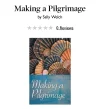LorneB
Member
- Time of past OR future Camino
- Camino Portugues - Porto to Vigo, 2017; Vigo to SDC to Muxia, 2018
In putting forward my questions below, I’m bearing in mind that one is expected to be delicate when posting in the forum about religious matters. I hope what I’m asking is in the right spirit.
I’m going to be resuming my walk along the Portugues soon (yes!). I’m not a Christian, and so was not especially attentive to Christian themes and points of significance while walking last year. My next time out, I’d like to have a better understanding of what a practicing Christian might do or seek while on the Camino. I wouldn’t have a lot of time for advance reading, but would be happy to put pauses in my walking days for some reading along the way.
I’d also appreciate having more information at hand about religious points of interest from a historical and cultural perspective if there are resources any of you would care to suggest.
Thanks all,
LorneB
I’m going to be resuming my walk along the Portugues soon (yes!). I’m not a Christian, and so was not especially attentive to Christian themes and points of significance while walking last year. My next time out, I’d like to have a better understanding of what a practicing Christian might do or seek while on the Camino. I wouldn’t have a lot of time for advance reading, but would be happy to put pauses in my walking days for some reading along the way.
I’d also appreciate having more information at hand about religious points of interest from a historical and cultural perspective if there are resources any of you would care to suggest.
Thanks all,
LorneB

















